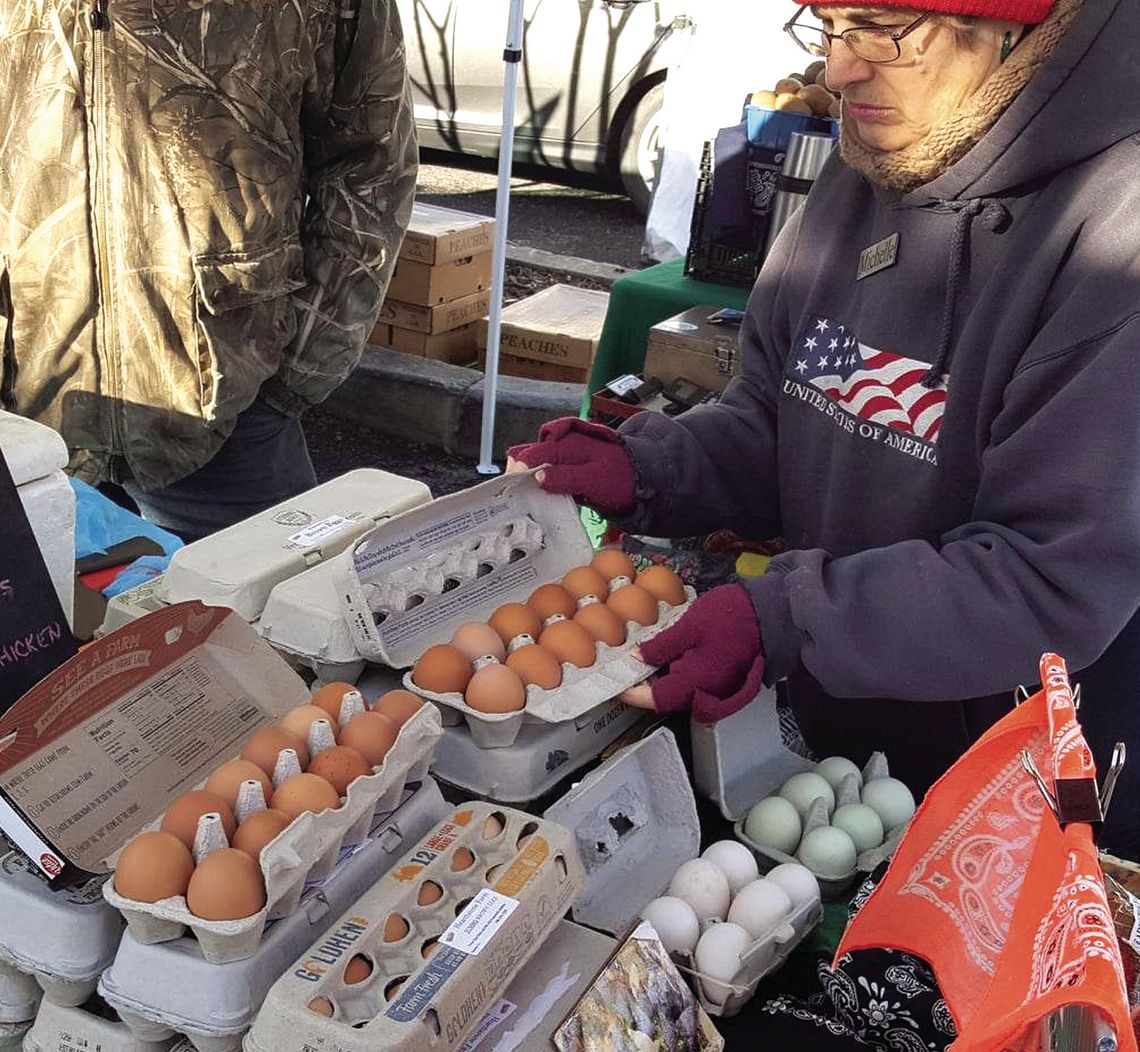If you’ve spent any time on social media over the past few weeks, you’ve probably seen a number of memes circulating joking about the recent increase in the cost of eggs, ranging from an image of an egg in a ring box with the caption “He went to Kroger” (instead of “He went to Jared’s”) to someone offering to trade a dozen eggs for a jeep.
Prices for the incredible edible egg have been steadily climbing since last spring, with the average cost of a dozen large, grade-A eggs nationwide being $4.25 at the end of the year, according to the U.S. Bureau of Labor Statistics - about what local grocery store shoppers have been seeing here.
The price is also more than double what consumers across the nation were paying on average the year before. In December 2021, the average price of a dozen eggs was $1.78.
While a part of that price increase has been due to the rising cost of raising chickens and running a commercial egg laying operation, a larger factor is an outbreak of Highly Pathogenic Avian Influenza (HPAI) or, as it’s more commonly known, avian flu.
Since the first outbreaks were reported last February, more than 58 million birds have been killed in the U.S., either by being sick or, more likely, in the process of euthanization designed to prevent the spread of the disease. The influenza is deadly to birds, killing infected animals in less than 48 hours, and is highly contagious and can spread through a flock quickly.
According to the most recent statistics from the Department of Agriculture’s Animal and Plant Health Inspection Service (APHIS), more than 43 million commercial egg layers have been affected, with nearly 20 outbreaks around the country that affected flocks of more than a million birds. Additionally, 2.5 million commercial broilers (chickens raised for meat) and nearly 9 million commercial meat turkeys have been affected throughout the country.
Virginia had its first outbreak in a commercial flock last week, with a commercial turkey operation in Rockingham County page B8 that affected 25,300 birds. Another 500 birds in smaller, backyard flocks throughout the state have also been impacted. So far, no flocks in Rockbridge County have been affected, including the one commercial egg laying flock in the county.
Tom Stanley, Virginia Tech Extension agent for Rockbridge County, noted that the loss of the commercial turkey flock in Rockingham was “very concerning.” He also noted that one of the reasons the impact has been more noticeable on the egg industry is that, even if replacement birds are readily available, it can take a few months to get an egg-laying operation back to where it was as far as production. - The large impact this flu has had on commercial egg production has been a big factor in the rising cost, not just of eggs, but of numerous other products as well, from mayonnaise to baked goods.
“The thing that’s catching everybody’s eye is eggs, because a dozen eggs is a dozen eggs and it’s easy to count and we can relate to that,” said George Huger, owner of The Southern Inn, “but this shortage of eggs is kind of rippling through the food chain, so to speak, both literally and figuratively, in many different ways that don’t catch everybody’s eye quite as much.”
Rising prices have had some impact on local restaurants and businesses, including The Southern Inn. Huger told The News-Gazette that the price of a case of eggs from one vendor he uses has more than doubled in the past year (from $33 to $70) and he’s been “doing a lot more shopping” as a result.
“If one company is selling eggs for 65 bucks a case, and another is selling for 53, we gotta buy them from the one selling them for 53,” he said. “So it means we spend a lot more time shopping than we used to. That’s the biggest thing. Other than paying attention to prices and raising prices, it means we have to be a lot more diligent in our shopping and where we’re getting stuff and who’s got the lowest and best price.”
Huger also said that he’s trying to “look at the big picture” and make adjustments to his menu where he can to utilize items that don’t cost as much to offset some of the increase in price of the items, even removing some items that are not cost-effective.
Not all restaurant owners have that ability, however. Shane Gonsalves, owner of Sweet Treats Bakery, uses eggs in everything he makes, so he’s unable to make too many changes to his menu, despite his cost of eggs increasing by “about 75 percent” by his estimate. He said he’d been getting a good deal from his wholesaler, but was recently told that the seller wasn’t able to honor that anymore due to the rising cost of eggs.
“That’s where my challenge comes in,” he said. “I was eating the cost of it before, but I can’t do that anymore, so I’ve had to pass that cost on to the consumer.”
Gonsalves said that he’s received fewer orders for cakes in the past few months than he normally does this time of year, though he wasn’t sure if that was more due to the price increase or people just spending less money due to inflation.
“Maybe it’s both of them, I don’t know,” he said. “If I was an expert in that kind of stuff, maybe I’d be a millionaire now.”
He’s also working on getting new menus printed to reflect the price increases for his products.
“So far, everybody’s been very good about it,” he said. “We haven’t had any issues with it.” - Prices for eggs have also gone up for some vendors at the Lexington Farmer’s Market, primarily due to the increased cost of feed for the birds. Mitch Wapner of Paradox Farms recently raised his prices for a dozen regular eggs from $5 to $6, and the price of his jumbo eggs from $6 to $7.
“In a sense, I’m just trying to keep up with supermarket prices, because the eggs are really worth much more than that,” he said. “I have to keep my prices in line with the supermarket so that people will buy the higher quality eggs at the same price, or a little cheaper price than the supermarket.”
Michelle Wells, of Hearthstone Farm, also sells eggs by the dozen at the farmer’s market. She hasn’t raised her prices yet (she currently charges $5 for a dozen regular eggs and $6 for jumbo), but noted that her feed costs have gone up as well.
“I want to go up, but I feel bad,” she said. “But we have to cover our costs.” -As bad as more expensive eggs may be, there are still, at least for the time being, eggs available at grocery stores in the Rockbridge area.
“I have children who live in Los Angeles, and they don’t have eggs on the shelves in some stores,” said Mary Rapoport, consumer affairs/educational director for the Virginia Egg Council. She added that she’d recently spoken to the dairy manager at her local Kroger in Roanoke and asked if there had been any issues with getting eggs for the store and was told there hadn’t been any difficulties with that. She also said that, even with the increase in cost for a dozen or carton of 18, the price per egg is still fairly cheap, especially for how many uses there are for eggs.
“They are still, even at this price, very versatile and, compared to other protein foods, they still are [more] affordable, unless you’re opening a can of beans,” she said.
She also noted that egg prices will, eventually, start going back down once the avian flu outbreak has subsided and commercial egg farms are able to replenish their flocks and get their operations running again.
“These prices are not going to last,” she said. “As soon as the supply goes up – and it doesn’t have to go up a ton – as soon as it goes up a little bit, prices will go down. I feel confident, as a consumer and as someone in the egg industry, that the price will come down. It always does.”
.jpg)




